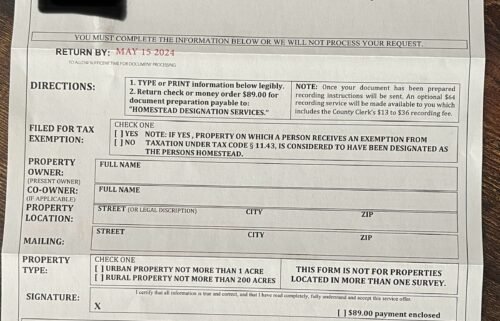7 cases of Legionnaires’ Disease under investigation at hospital
Click here for updates on this story
Mt Clemens, MI (WXYZ) — Officials with the Macomb County Health Department and the Michigan Department of Health and Human Service are investigating what may be seven possible cases of Legionnaires’ Disease at McLaren Macomb Hospital.
The cases have been reported since late July, with six of the seven cases being reported since mid September.
Officials stress the investigation is ongoing and a source has not been identified. The hospital is cooperating and released the below statement:
Like many communities in our state, Macomb County has experienced an increase in the number of Legionnaires’ disease diagnoses in recent months, with 45 cases so far this year and 96 cases in the last 12 months.
Seven of those cases have been diagnosed in patients who spent time in our facility since late July. Though the investigation is ongoing and a definite source has not been identified, we are responding with an abundance of caution and partnering with the Macomb County Health Department to identify targeted areas in the hospital to implement additional precautions to our water management efforts (installing filters, removing aerators, providing bottled water options).
Additionally, though our ongoing water testing program has not indicated any signs of the growth of legionella (the bacteria that causes Legionnaires’ disease) we will be increasing the frequency of water testing in our facility and will continue to work closely and share information with county health officials.
The Macomb County Health Department reminds that Legionnaires’ disease is a respiratory infection with symptoms that include fever, cough and radiologic findings consistent with pneumonia.
Legionella bacteria are naturally occurring in fresh water sources. The organism can multiply in manmade water systems such as cooling towers, decorative fountains, hot tubs and large building plumbing systems. If Legionella grows and multiplies in a building water system, water containing Legionella can spread in droplets small enough for people to breathe in. People can get Legionnaires’ disease when they breathe in small droplets of water in the air that contain the bacteria.
Individuals at higher risk for LD include those who are age 50 or older; have a current or past smoking history; or have an underlying illness or condition such as chronic lung disease, kidney or liver failure, diabetes, systemic malignancies, or immune system disorders due to medications or disease. Recent travel and overnight stays in hospitals or other healthcare facilities can increase an individual’s risk for exposure to LD.
Further information regarding LD is available from the CDC website at CDC.gov/legionella [links.govdelivery.com] .
They are also working to identify any other patients who may have been infected.
McLaren Hospital and CEO Tom Brisse released the following statement:
We appreciate the County’s partnership on this community health issue. With nearly 100 cases of Legionella diagnosed across Macomb County over the past 12 months, this represents an opportunity and a need for the healthcare community, the Macomb County Health Department, and other key stakeholders to collaborate in order to minimize the health risk to our community.
Here is some information on Legionnaires’ and Legionella released by the health department:
LD is a respiratory infection caused by Legionella bacteria. LD is a severe infection that includes symptoms of fever, cough and radiologic findings consistent with pneumonia. Legionella bacteria are naturally occurring in fresh water sources. The organism can multiply in manmade water systems such as cooling towers, decorative fountains, hot tubs and large building plumbing systems.
After Legionella grows and multiplies in a building water system, water containing Legionella can spread in droplets small enough for people to breathe in. People can get LD when they breathe in small droplets of water in the air that contain the bacteria.
Individuals at higher risk for LD include those who are age 50 or older; have a current or past smoking history; or have an underlying illness or condition such as chronic lung disease, kidney or liver failure, diabetes, systemic malignancies, or immune system disorders due to medications or disease. Recent travel and overnight stays in hospitals or other health care facilities can increase an individual’s risk for exposure to LD.
Patients with pneumonia should be tested for LD if they have any of the following histories:
Have failed outpatient antibiotic treatment for community-acquired pneumonia.
Are immunocompromised.
Are admitted to the ICU.
Traveled within 10 days prior to symptom onset.
Were recently hospitalized.
Developed pneumonia ≥48 hours after hospital admission.
If you are concerned about possible symptoms of pneumonia you should contact your primary care provider. Further information regarding LD is available from the CDC website at Cdc.gov/legionella .
Please note: This content carries a strict local market embargo. If you share the same market as the contributor of this article, you may not use it on any platform.


